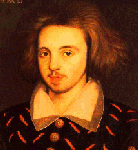Christopher Marlowe
Two early contemporaries of Shakespeare experimented with Senecan tragedy: Thomas Kyd and Christopher Marlowe. Marlowe is--rightly--better known, but seems to have had less direct influence on Shakespeare.
Marlowe was a controversial figure. He was born in the same year as Shakespeare, the son of a shoemaker, and graduated from Cambridge in 1584, at the age of 20.
The mighty line
Marlowe is best known for his brilliant Doctor Faustus, the story of a university man (like Hamlet) who sold his soul to the devil. In both Doctor Faustus and the earlier, two-part play, Tamburlaine, Marlowe created what Ben Jonson called his "mighty line."
Faustus' famous lines to Helen of Troy, whom he has had Mephistophilis re-create for him, are a good example:
Was this the face that launched a thousand ships
And burnt the topless towers of Ilium?--
Sweet Helen, make me immortal with a kiss.--
(Kisses her)
Her lips suck forth my soul: see where it flies!--
Come Helen, come, give me my soul again.
Here will I dwell, for heaven is in these lips,
And all is dross that is not Helena. . .
Oh thou art fairer than the evening air
Clad in the beauty of a thousand stars;
Brighter art thou than flaming Jupiter
When he appeared to hapless Semele;
More lovely than the monarch of the sky
In wanton Arethusa's azured arms;
And none but thou shalt be my paramour.
(5. 1. 109-127)
Others had used blank verse before Marlowe, but none had shown what an astonishingly eloquent vehicle it could be. In his plays written at the same time as Marlowe's, Shakespeare's verse is noticeably less striking.
Christopher Marlowe's Complete Works are provided by the Perseus Project at Tufts University.
